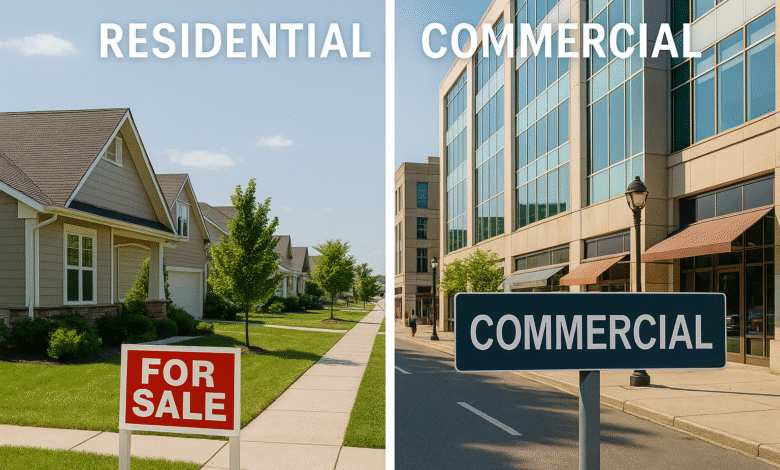Residential vs Commercial Land: Simple Guide for Smart Investors

Introduction:
Residential vs Commercial Land, which one should you invest in?
It’s a question many Nigerians ask when they’re ready to buy property but aren’t quite sure where to start. Maybe you’ve heard people say commercial land brings higher returns, or residential land is safer and easier to manage. But which one really makes sense to you?
In this guide, I’ll break things down in the simplest way possible. As a result, you will get straight facts, and answers to the questions smart investors (like you) are already asking.
By the end, you’ll know exactly what each land type offers, what the risks are, and which one fits your budget and future plans. Ready? Let’s dive in.
Residential vs Commercial Land
Residential land is space set aside for homes. Think bungalows, flats, duplexes, or small estates. Commercial land is ground meant for businesses and basically to make profit. Think shops, offices, hotels, and warehouses. Because both sit under separate zoning laws, you must build the right thing on the right soil.
The maintenance needs for residential and commercial properties differ significantly. Residential properties typically require basic upkeep like painting, plumbing, and electrical work. While, maintenance for bare land requires just clearing, weed control, fencing, signage that can deter fraudsters, community levies and inspection visits.
Commercial properties, however, demand more intensive maintenance, including security systems, parking lot management, and safety lighting. And for bare land you consider fencing as well, drainage clearance, environmental compliance, ground marking and leveling. Furthermore, commercial properties face greater public liability risks, requiring more extensive insurance coverage.
When deciding on a commercial property investment, consider your goals, financial capacity, and market demand by determining whether you prioritize rental income or long-term growth, ensuring you can afford at least a 30% down payment, assessing tenant or shopper demand in the area, reviewing local laws and regulations regarding mixed-use or special permits, and then swiftly selecting a suitable plot before prices increase.
Cost and Financal Explanations of Residential vs Commercial
When it comes to price, residential plots usually cost less upfront. Commercial plots sit in high-traffic areas, so their value is often higher. For example, a 450 sqm residential plot in Epe might go for ₦4 million, while a 600 sqm commercial plot in that same Epe could cost ₦6 – 6.5 million.
Banks also treat them differently. They may finance up to 90% of a residential plot’s value but only about 60–70% for commercial land. You’ll also find extra costs like soil testing and environmental assessments on commercial land, while residential plots usually just need a survey plan and basic approvals.
Residential vs Commercial Land: Key Legal Facts in Nigeria
In Nigeria, land ownership is governed by the Land Use Act of 1978, which vests all land in a state under the authority of the state governor. Whether you’re buying residential or commercial land, legal due diligence is a must. Here’s how they differ:
1. Land Title Documentation
- Residential Land often comes with a Certificate of Occupancy (C of O), Deed of Assignment, or in some developing areas, an Excision or Gazette.
- Commercial Land usually requires Governor’s Consent for transactions, and often has a Purpose Clause stating it must be used for business or income-generating activities.
Tip: Buying land without a valid title document or C of O can lead to future disputes or revocation.
2. Zoning and Use Approval
- Each state has zoning regulations that determine what structures can be built where.
- Residential zones restrict developments to homes, apartments, and estates.
- Commercial zones permit shops, plazas, offices, and similar developments.
- Trying to build commercial structures on residential land without a change-of-use approval from the local planning authority can get your structure demolished.
3. Building Plan Approval
- Both land types require approved building plans from local development authorities (e.g., LASPPPA in Lagos).
- Commercial buildings undergo stricter scrutiny. You’ll need:
- Environmental Impact Assessment (EIA) for large-scale projects
- Fire Safety Certificate
- Parking and Traffic Flow Assessment
- Environmental Impact Assessment (EIA) for large-scale projects
4. Land Charges and Taxes
- Commercial landowners often face higher Land Use Charges, tenement rates, and business premises levies.
- Residential land typically has lower yearly obligations unless developed into multi-unit apartments for rent.
5. Legal Restrictions
Commercial land in high-value zones may be subject to stricter acquisition processes and require additional documentation.
In areas under government acquisition, residential plots may be easier to ratify.
Key Differences Between Residential vs Commercial Land
| Feature | Residential Land | Commercial Land |
| Zoning Laws | For housing use only | For business and profit-making use |
| Return on Investment | Moderate but stable | Higher but riskier |
| Development Process | Simpler, faster approval | More complex, stricter compliance |
| Buyer Demand | Steady and widespread | Niche, location-driven |
| Cost | Usually more affordable | Generally more expensive |
Pros and Cons of Residential vs Commercial Land
Pros of Residential Land
- Easier to buy and sell.
- Lower entry cost.
- Steady demand from families.
- Simpler upkeep.
Cons of Residential Land
- Lower rent yield.
- Smaller tax breaks.
- Limited use under zoning.
Pros of Commercial Land
- Higher rent per square meter.
- Longer lease terms.
- Tenants often pay for fit-out and upkeep.
Cons of Commercial Land
- High purchase price.
- Stricter laws.
- Vacancy risk in bad times.
Frequently Asked Questions
1. Can I convert a home plot to shop use?
Yes, but only after approval from the right authority.
2. Which land type appreciates faster?
Generally, prime commercial plots grow quicker in hot markets, yet safe home plots in strategic locations rise steadily.
3. Is commercial land harder to sell?
Usually yes, since buyers need deeper pockets.
4. What permits do I need for shops?
You need a building plan approval, fire safety check, and often an environmental report.
5. Can I convert residential land to commercial use in Nigeria?
Yes, but you must apply for a Change of Use at the state’s urban planning authority. Without this approval, using residential land for business can attract penalties or demolition.
6. What documents should I look for before buying residential or commercial land?
At minimum:
- Residential: C of O, Deed of Assignment, Survey Plan, Excision (if applicable).
- Commercial: C of O, Governor’s Consent (for resale), Environmental Impact Assessment (for large projects), Planning Permit.
Always run a land verification check at the Ministry of Lands or relevant agency.
7. What are the weaknesses of residential vs commercial land?
Residential land tends to yield lower rental income and grows slower in hot markets, but it’s easier to manage and resell. On the other hand, commercial land offers higher returns but comes with bigger financial risks, higher entry costs, and stricter planning laws. It also takes longer to sell and requires more active management.
8. What are the risks of investing in residential vs commercial land?
With residential land, the main risks are slower appreciation, encroachment if left undeveloped, and zoning limitations. Commercial land carries bigger risks like market fluctuations, prolonged vacancy, tougher regulations, land use charges, and possible disputes over title or use. Proper documentation and market research are key before investing in either one.

Conclusion
Now you see the clear gap. Because the facts are simple, the choice is clear. Residential land gives ease and calm growth. Commercial land offers bold returns yet bigger storms. Therefore, match the land to your goal. Move today, and watch your plot turn into wealth.
Whether you’re looking to get a peaceful residential plot or a profitable commercial space, making the right choice starts with the right support. If you need help deciding or want to explore verified opportunities, feel free to reach out, we’re always happy to guide you through.




